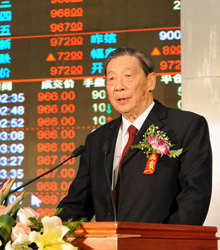| Tea Time With Economist
 |
|
(XINHUA) |
Mao Yushi, an 84-year-old economist at Unirule Institute of Economics, had tea with six people in a tea house in Chengdu, capital city of southwest China's Sichuan Province, on July 16. The six people won the chance to drink tea with Mao and his wife in a bid of 259,000 yuan ($40,481) in an online auction. They asked questions concerning international trade, education, inflation, housing prices and even the value of life at the tea table. The money raised from the auction will support academic research at Unirule Institute of Economics.
Mao has been compared to Warren Buffett, the legendary American investor who has raised more than $11.5 million in his past 13 annual lunch auctions. Buffett hosted a record-breaking bid of $3,456,789 this year. The money raised from these auctions is used to help the poor and homeless.
Born into a family of scholars in 1929 in Nanjing, capital city of east China's Jiangsu Province, Mao is one of the most influential Chinese economists. His father, Mao Yixin, is a railway mechanics engineer and his uncle, Mao Yisheng, is an outstanding bridge engineer. Mao graduated from the Department of Mechanical Engineering of Shanghai Jiao Tong University in 1950 and worked at Tsitsihar Railway Administration as an engineer after graduation. He retired from the Chinese Academy of Social Sciences in 1993 and established Unirule Institute of Economics with four other economists.
Sanguine Job Situation
China's urban registered unemployment rate stood at 4.1 percent at the end of June, the Ministry of Human Resources and Social Security (MOHRSS) said on July 25.
The rate remained unchanged for the eighth consecutive quarter during the April-June period, and rested below the government's 4.6-percent annual target set for this year.
China created 6.94 million new jobs in urban areas in the first half, fulfilling 77 percent of its annual target of creating 9 million new jobs, said Yin Chengji, spokesman of MOHRSS.
A total of 2.94 million laid-off workers were reemployed in the first six months, meeting 59 percent of the annual target to have 5 million unemployed workers move back into jobs.
The country's central and western regions were a major force in creating jobs in the first half. Labor-intensive industries have been gradually moving to the central and western areas from eastern coastal regions in recent years, as part of the country's efforts to upgrade its industries.
Trade Remedy Abuse
The Ministry of Commerce on July 23 repeated its calls for the EU to avoid abusing trade remedy measures to disrupt bilateral trade, after the EU's highest court recently ruled in favor of a Chinese enterprise.
"For a long time, the European Commission has been abusing the discretionary power and misusing relevant laws in its trade investigations, which have led to unjustified trade remedy measures," said a statement posted on the ministry's website.
The ministry said as an important member of the WTO, the EU should strictly observe trade rules.
The remarks came in response to a court ruling that rejected an appeal by the EU Council to impose anti-dumping duties on imports of the herbicide glyphosate produced by China's Zhejiang Xinan Chemical (Xinanchem) because of the Chinese Government's minority stake in the company.
The ruling said the state's control over the general meeting of Xinanchem's shareholders did not automatically exclude the company from the benefit of market economy treatment, marking a landmark victory for Chinese companies seeking market economy treatment in Europe.
Rare Earth Protection
China will continue to protect its rare earth resources while working to solve disputes with other countries on its rare earth policies within the WTO framework.
"In any case, the Chinese Government will surely provide reasonable protection for rare earth resources and ensure environmental protection and sustainable development while making use of the resources," said Zhu Hongren, chief engineer of the Ministry of Industry and Information Technology, on July 25.
The remarks came after the WTO on July 23 established a panel to consider China's exports of rare earths, tungsten and molybdenum following complaints brought by the United States, the EU and Japan over China's export restrictions of those materials.
Zhu said China is willing to hold discussions and carry out full consultations within the WTO framework to solve the disputes.
"Some countries with rich rare earth resources have not mined their own land for environment protection or other reasons, but made groundless accusations against China and repeatedly ignored the widely-known pollution caused by rare earth exploitation in the country," Zhu said.
Bond Agreement
The Bank of Indonesia and the People's Bank of China signed an agreement on July 21 to enable the Bank of Indonesia to invest in China's inter-bank bond market.
The Indonesian central bank has already started investing in the nation's inter-bank bond market.
The People's Bank of China said that it welcomes the Indonesian investment and believes the move will boost financial cooperation between the two countries.
As part of the country's overall plan to promote the yuan's use as a global reserve currency, China has allowed overseas financial institutions to invest in its domestic inter-bank bond market as part of a trial program implemented in 2010 to widen investment channels for overseas yuan funds.
Under the program, yuan accumulated overseas through central bank currency swaps, trade settlement or yuan investment can be used to invest in China's inter-bank bond market.
Overseas Acquisition
Sany Heavy Industry, a leading Chinese manufacturer of construction machinery, announced on July 24 that it has fully acquired Intermix GmbH, a German truck mixer maker.
Sany spent 8.1 million euros ($9.72 million) to buy all of Intermix from its founder Hans-George Stetter on July 19 through its subsidiary Putzmeister, a German concrete machinery manufacturer, according to a Sany statement.
The acquisition will expand Putzmeister's product portfolio, extend its industry chain and better collaborate with Sany's existing business.
Intermix, founded in 1984, is the third largest manufacturer of truck mixers in the world. | 